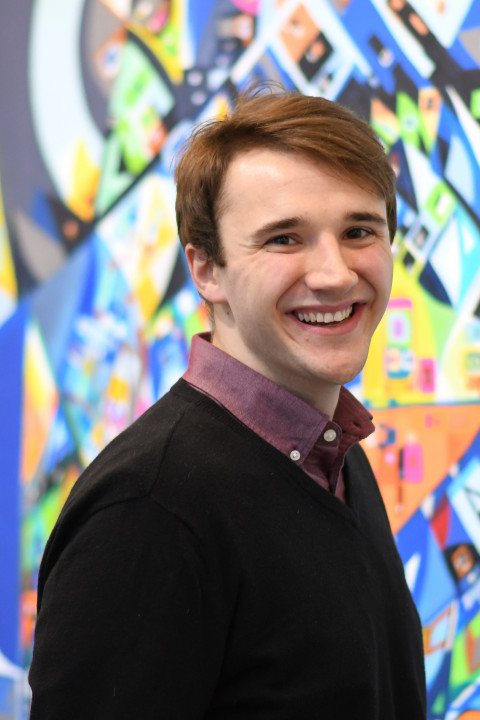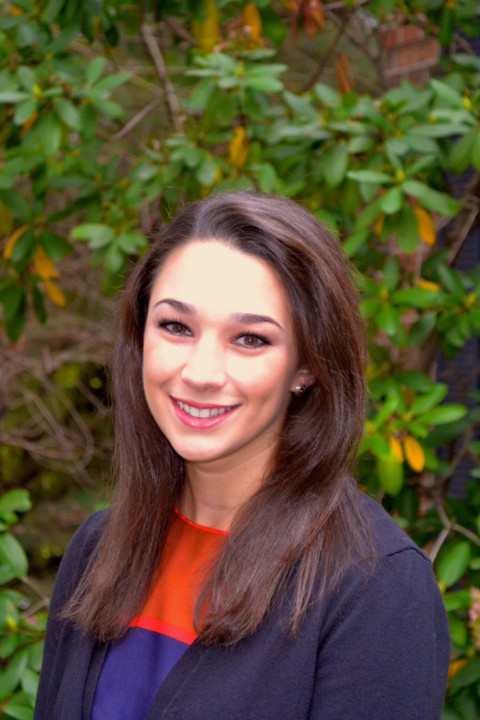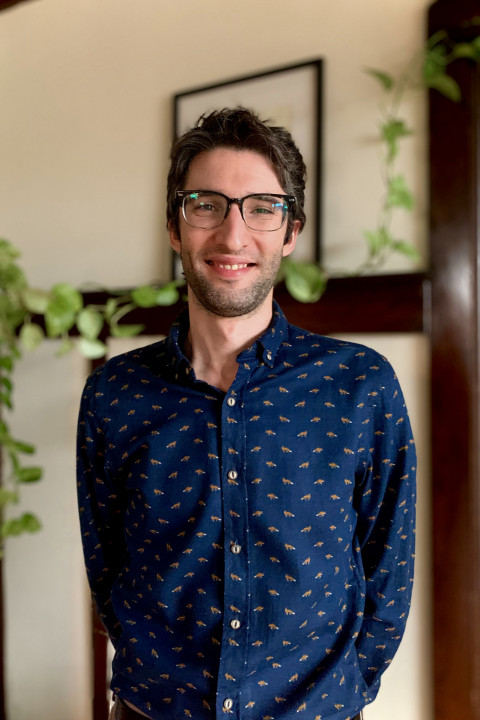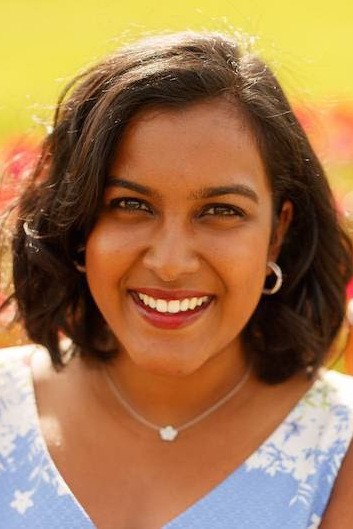Adam Antoszewski, Anna Band, Bastien Craipain and Shreya Ramachandran have been named the 2020 winners of the Wayne C. Booth Prize for Excellence in Teaching, awarded annually to graduate students for outstanding instruction of undergraduates.
Students and faculty in the College nominated the recipients for the prize, which was established in 1991 in honor of Booth, PhD’50, the late UChicago faculty member who was one of the 20th century’s most influential literary critics.
In addition to the Booth Prize, the University recently announced faculty winners of the Llewellyn John and Harriet Manchester Quantrell Awards, believed to be the nation’s oldest prize for undergraduate teaching, and the winners of the newly established Glenn and Claire Swogger Award.
Learn more about this year’s Booth Prize recipients below:
Adam Antoszewski

Adam Antoszewski knows that a subject like quantum mechanics is difficult to learn. That’s why it’s his priority to create interactive and engaging material for every course he teaches.
“Academically, sometimes you have to abandon your preconceptions and start fresh,” he said. “In the class, we had to learn a completely new mathematical language to even describe the basic postulates of quantum mechanics. While much of scholarship is based on precedent and building off of previous work in your field, sometimes you have to consider work from seemingly disparate areas for inspiration to solve novel challenges.”
As a PhD candidate in chemistry, Antoszewski specializes in computation and biophysical simulation. His research investigates how insulin interacts with itself and with the cell, with aims of designing more effective diabetes therapeutics.
In addition to quantum mechanics, Antoszewski has taught the undergraduate Honors General Chemistry sequence and the graduate course “Advanced Special Topics in Theory and Computation.” He looks forward to teaching and mentoring throughout his career.
“I have been afforded an incredible amount of pedagogical freedom, helping to design interactive and engaging material for both lecture and discussion,” Antoszewski said. “The real pleasure, however, has been the curiosity and kindness of my students.”
Anna Band

As a PhD candidate in history, Anna Band specializes in the social, cultural, intellectual and literary history of German-speaking Jewry. While at UChicago, she has taught three courses of her own design on Jewish history and Jewish studies: “Gender and Sexuality in Jewish Society: Early Modernity Through the Present;” “Grey Zones: Ethics and Decision-Making in the Holocaust;” and “Jews and the City: Migration and Urbanization in the Modern Jewish Diaspora.” In each of these courses, she draws heavily from primary sources to help students engage with the subject.
“It is important for my students to develop a sense of historical empathy and learn to treat historical actors as agents rather than as subjects,” she said. “Understanding how people thought, felt and made decisions is a crucial component of comprehending the course of historical events themselves.”
Band’s research focuses on Jewish identity and belonging in the urban environment of Berlin from World War I through the Weimar Republic.
“Currently, my students are using different types of primary sources to create geographic information system maps that analyze the relationship between Jewish migration and urbanization in some of the major global urban centers which absorbed Jewish migrants in the late 19th and early 20th centuries,” Band said. “I am incredibly grateful for the opportunity to experiment with cutting edge pedagogy in the fields of history and Jewish studies.”
Bastien Craipain

Originally from the southwest of France, Bastien Craipain is a doctoral candidate in French and Francophone studies at UChicago. As an instructor, he has taught various language, literature and culture courses, including “Anthropologie, littérature et société” and “Short Stories of the Black Atlantic: A Francophone Perspective,” for which he received the Stuart Tave Teaching Fellowship.
When approaching a text with his students, Craipain encourages “collaborative thinking.”
“No one is ever alone when it comes to approaching a text—others have read it before you, and others will probably read it after you,” he said. “So, when I am in class with my students, I try my best to help them understand that the best interpretation they can offer of a given text—or any sort of cultural artifact for that matter—is probably the one they had not thought about until they shared and discussed it with their peers.”
In dialogue with Haitian and Caribbean studies, critical race theory and Black Atlantic history, Craipain’s research focuses on the relationship between literature and the social sciences in the nineteenth- and twentieth-century Francophone world. His dissertation analyzes the ways in which Haitian social thought and literature have contributed to the field of North Atlantic anthropology.
“In language as in literature courses, what I have enjoyed the most was to see students’ eagerness to engage with diverse traditions of the Francophone world. It is a truly rewarding experience to see students leave your classroom having gained a whole new level of linguistic competence and cultural awareness. Especially because in seeking new connections with the cultural Francosphere, they also get to reconsider their own perceptions of the world,” Craipain said.
After graduating this summer, Craipain will continue to teach at UChicago as a Humanities Teaching Fellow.
Shreya Ramachandran

Before coming to UChicago, Shreya Ramachandran majored in neurobiology at Stanford and spent a year researching population genetics in Afro-Mexican communities in Mexico through a Fulbright Fellowship. A second-year PhD student in Maanasa Raghavan’s lab, Ramachandran’s thesis is about the gut microbiome in both hunter-gatherer and industrialized populations of humans. Her passion for researching—and teaching—human genetics has only grown since she began her graduate education at UChicago.
Ramachandran was a teaching assistant for BIOS 21306: Human Genetics this past fall, and in Autumn 2020, she will be a teaching assistant for HGEN 47000: Human Genetics. Her experiences with teaching undergraduates have transformed the way she understands her research.
“I really loved getting the chance to meet undergraduate students that I otherwise wouldn't have gotten to know,” Ramachandran said. “These students were bright, motivated and compassionate, and inspired me to think about familiar material in new and creative ways.”
Through these experiences, Ramachandran has confirmed that she would like to pursue a career teaching undergraduate students while considering the big questions that affect the field of human genetics.
“I hope [my students] discover an appreciation of the evolutionary forces that have shaped the human variation we see today and how much we can learn about the past from data we gather in the present day,” she said. “At the same time, in an era when genetic conclusions are often misinterpreted to justify bigotry, I hope students can learn how to wield their scientific powers wisely, and effectively communicate their science to affirm the inherent value of all humans.”